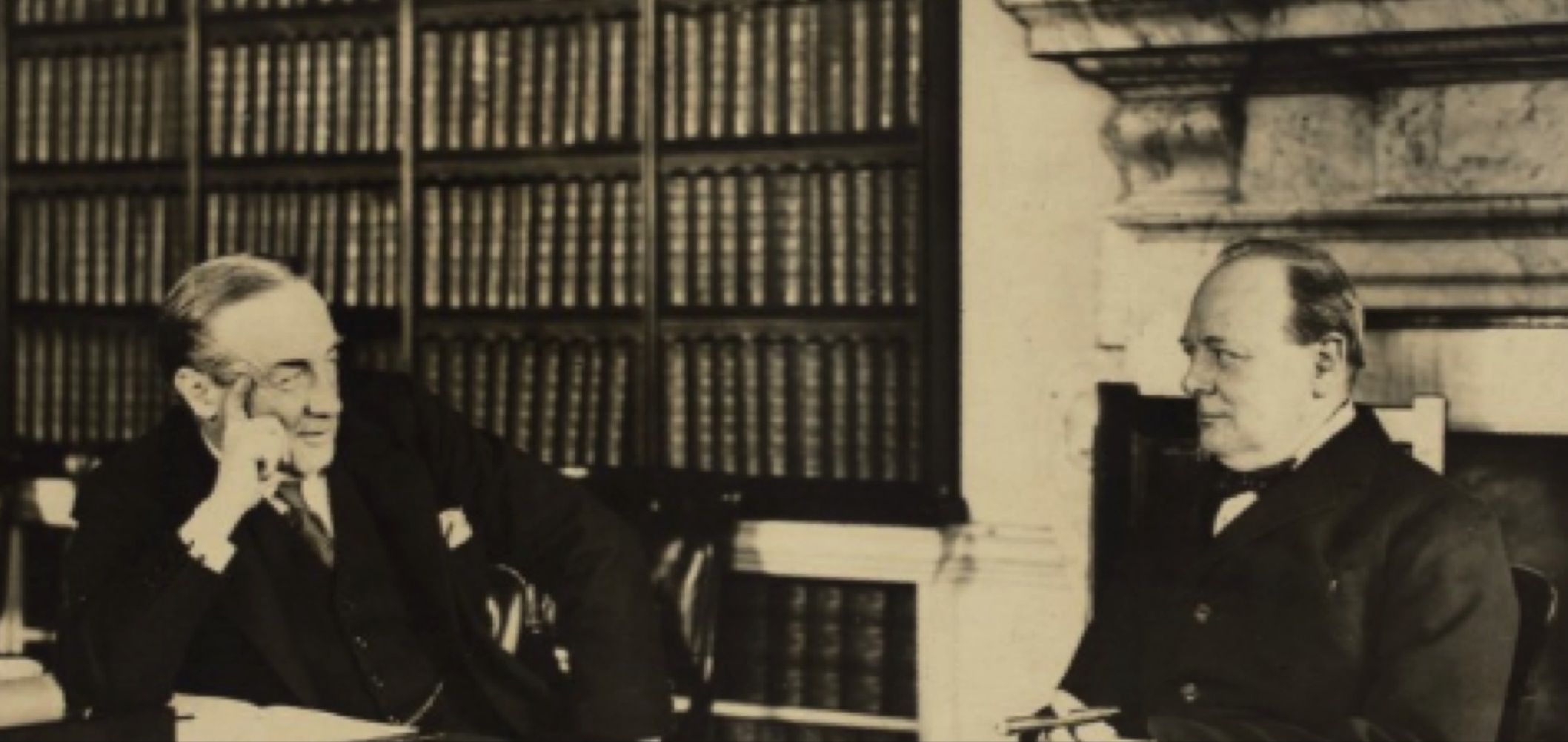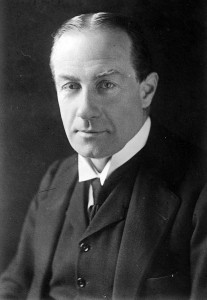
Churchill’s Consistency: “Politics Before Country” (Part 1)
“Churchill’s Consistency,” first published in 2011, is updated with material from my book, Churchill and the Avoidable War. It exonerates, partially, the statements and actions of Mr. Baldwin in the debate of rearmament in the 1930s.
“Politics before country”
A U.S. Congressman, observing America’s spending problem, proposed an elaborate plan to fix it. In the process he didn’t wilt under the assault directed toward anyone who defies the status quo by proposing practical change. Intending to defend his ideas in a speech, his private office asked me to verify what Churchill said on consistency among politicians. I learned something in the process…

In 1936, Britain’s Prime Minister, Stanley Baldwin, put politics before country by failing adequately to rearm. This, the Congressman said, reminded him of certain political behavior today. In Parliament, Baldwin bluntly admitted that fear of losing an election motivated his failure to rearm in the face of Nazi Germany.
“All powerful to be impotent”
Churchill on rearmament was nothing if not consistent. On 12 November 1936, as he recalled later,
…I severely reproached Mr. Baldwin for having failed to keep his pledge “[to] see to it that in air strength and air power this country shall no longer be in a position inferior to any country within striking distance of its shores.” I said: “The Government simply cannot make up their minds, or they cannot get the Prime Minister to make up his mind. So they go on in strange paradox, decided only to be undecided, resolved to be irresolute, adamant for drift, solid for fluidity, all-powerful to be impotent. So we go on preparing more months and years—precious, perhaps vital, to the greatness of Britain—for the locusts to eat.”[1]
Baldwin replied with an astonishing admission:
You will remember at that time there was probably a stronger pacifist feeling running through this country than at any time since the war…. Supposing I had gone to the country and said that Germany was rearming, and that we must rearm, does anybody think that this pacific democracy would have rallied to that cry at that moment? I cannot think of anything that would have made the loss of the election from my point of view more certain.[2]
1936: “A squalid confession”
For Churchill, consistency on such issues was paramount. He saw Baldwin’s admission as reprehensible. He replied to Baldwin that same day, 12 November 1936:
I never would have believed that we should have been allowed to go on getting into this plight, month by month and year by year, and that even the Government’s own confessions of error would have produced no concentration of Parliamentary opinion and force capable of lifting our efforts to the level of emergency. I say that unless the House resolves to find out the truth for itself it will have committed an act of abdication of duty without parallel in its long history.[3]
The following day, in a private letter to a friend, Churchill leaped upon Baldwin’s statement: “I have never heard such a squalid confession from a public man as Baldwin offered us yesterday.”[4]
1948: “Naked truth into indecency”
Consistency, consistency… Churchill returned to Baldwin’s 1936 confession in his war memoirs. Baldwin’s 1936 statement, he wrote, was one of “appalling frankness…
It carried naked truth about his motives into indecency. That a Prime Minister should avow that he had not done his duty in regard to national safety because he was afraid of losing the election was an incident without parallel in our Parliamentary history. Mr. Baldwin was of course not moved by any ignoble wish to remain in office. He was in fact in 1936 earnestly desirous of retiring. His policy was dictated by the fear that if the Socialists came into power even less would be done than his Government intended. All their declarations and votes against defense measures are upon record. But this was no complete defense, and less than justice to the spirit of the British people.[5]
It is obvious that Baldwin abandoned the political good of consistency. This is not unique. Politicians—then and now—frequently put politics or party before country. But rarely does one admit it—particularly the leader of a government.
Where Churchill was wrong
There is however a technical criticism of Churchill’s statements. In both The Gathering Storm and his 1938 speech volume, Arms and the Covenant, he quoted Baldwin selectively. Among key omissions was Baldwin’s statement that the 1935 election gave him “a mandate for [rearming] that no one, twelve months before, would have believed possible.” Had he taken more rearmament measures, he said, “it would have defeated entirely the end I had in view.”[6]
Note the “twelve months before.” Churchill had unfairly implied that Baldwin was referring to the actual election in November 1935. In fact, Baldwin was speaking of a hypothetical election in 1933-34. Indeed, on 12 November 1936, Churchill in Parliament stated that in 1935, Baldwin had campaigned in support of rearmament.
Baldwin was not entirely guiltless. To appreciate this, one must read the entire passage from Churchill’s 12 November 1935 speech. Baldwin had “fought and largely won” the 1935 election on rearmament, Churchill said. But
…he also made the statement: “I give you my word there will be no great armaments…. There has not been, there is not, and there will not be any question of huge armaments or materially increased forces.” Frankly, I do not understand what that could have meant, because an Air Force equal to the gigantic force being constructed in Germany would certainly involve a huge expenditure…. [7]
The difference in statecraft
Baldwin admitted that, had there been a 1933-34 election, he would not have pushed for rearmament, fearing he would lose. He gave mixed messages about how much he would rearm in the actual election (1935). Churchill’s ringing declaration the previous June stands in contrast to Baldwin’s:
I would endure with patience the roar of exultation that would go up when I was proved wrong, because it would lift a load off my heart and off the hearts of many Members. What does it matter who gets exposed or discomfited? If the country is safe, who cares for individual politicians, in or out of office?[8]
The difference in statecraft is very clear. 1) Baldwin wished to rearm—to what degree was unclear. He did campaign for it in the 1935 election; he won, and began to rearm. 2) Baldwin was more reluctant about risking votes than Churchill, and was less urgent and ambitious about the Nazi threat. 3) Baldwin’s and Chamberlain’s rearmament efforts did leave Britain better defended by 1940. But it would have helped to have had more, as Churchill consistently asserted.
Endnotes
[1] Winston S. Churchill, The Gathering Storm (London: Cassell, 1948, 169-70. In other editions this falls in the middle of Chapter XII.
[2] Martin Gilbert, Winston S. Churchill, vol. V, The Prophet of Truth 1922-1939 (Hillsdale, Mich.: Hillsdale College Press, 2009), 798.
[3] Richard M. Langworth, ed., Churchill in His Own Words (London: Ebury Press, 2012), 250.
[4] WSC to Sir Archibald Boyd-Carpenter, 13 November 1936, in Gilbert, Prophet of Truth, 799.
[5] Churchill, The Gathering Storm, 169-70.
[6] Richard M. Langworth, Churchill and the Avoidable War (Moultonborough, N.H.: Dragonwyck, 2015), 88, quoting Baldwin in Hansard, 317: 1145-46.
[7] Langworth, Avoidable War, 88, quoting Churchill in Hansard, 317: 1105-06.
[8] WSC, House of Commons, 20 July 1936, in Langworth, Churchill in His Own Words, 493.
Consistency in Politics concludes in Part 2.






